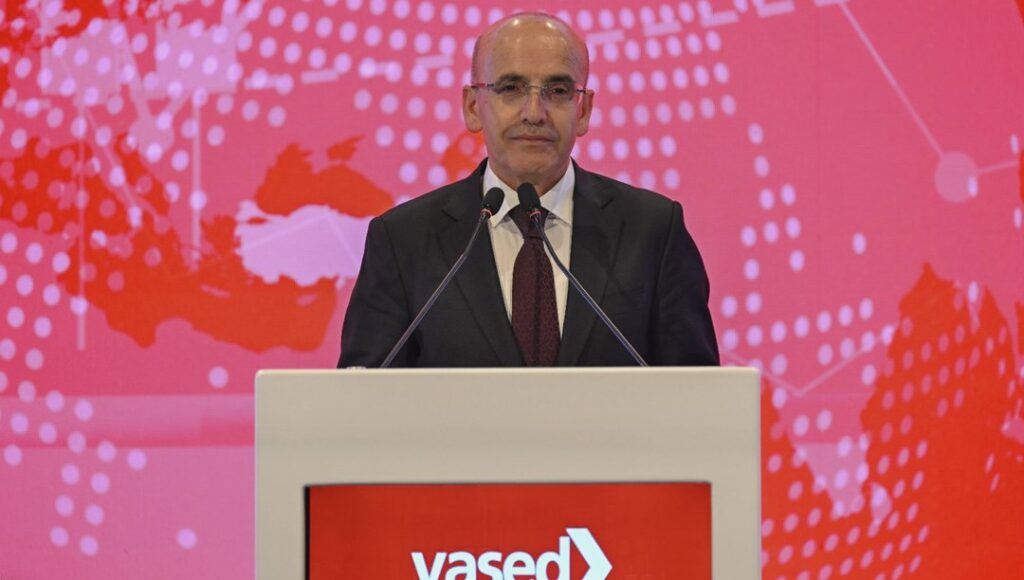Speaking at the Global Investment Days event organised by the International Investors Association (YASED) in Ankara, Mehmet Şimşek said the Turkish economy is a large one that cannot be ignored.
Commenting on factors that will affect growth in the medium to long term, Şimşek explained that protectionism and fragmentation in trade are dragging down global growth. Artificial intelligence and structural reforms are among the factors that will boost growth, he said, adding:
“We have a very strong structural reform agenda: strengthening human capital, improving the investment environment, deepening capital markets, fiscal reform, green transformation, digital transformation. All of this is aimed at making Turkey more competitive, more productive and more capable,” he said. “Looking at the reform agenda from another perspective, there is already political stability here. We are as sensitive to all these issues as you are and we are working on these issues.”
Şimşek said that they are considering improving the investment climate as a separate topic and that it is an important issue in itself, and stressed the importance of integrating into the global economy. Şimşek said, “If we can continue this reform agenda the way we are currently implementing it, then according to global standards, in two years we will see an additional four percentage points increase in national income and in four years we will see an additional eight percentage points increase in output,” he said.
Noting that industrial transformation is one of the priorities, Şimşek said in a statement: “Global scholars say Turkey can play a leading role in ensuring the world’s green transformation. The innovation index continues to improve; our country is ranked 39th out of 132 countries. We are well positioned in the World Bank Logistics Index.”
Şimşek noted the development of infrastructure investment and said that the country is better than the average of developing countries in the field of artificial intelligence. He said that the potential of artificial intelligence is high and the level of preparation is not bad.
“We want to create further opportunities through structural reform.”
Simsek pointed to high debt as a factor that holds back economic growth, saying Turkey’s debt will never be a speed limit. Simsek said supplies from neighboring regions were a trend during the COVID-19 pandemic, “but if you ask me what the biggest trend is now, it’s supplies from friendly and allied countries,” he said.
Simsek highlighted that Turkey is one of the countries less affected by problems in global trade and spoke about a stabilization and reform program designed to increase predictability for investors.
“This program is a program designed to increase the predictability of the economy. That’s what it is, because it’s really very difficult to operate in a high inflation environment. It’s not easy. As a country, we’ve been through a lot of stress,” he said. “But we should still be able to get inflation down to single digits, or even low single digits. By ensuring budget discipline, we hope to ease the burden on today’s generation and future generations.”
“It will take time for inflation to fall to single digits.”
Şimşek said it will take time for inflation to fall to single digits. We are on the brink of permanent and strong disinflation, he said, adding:
“From next month, inflation will start to fall very sharply. This is our path. We have entered a disinflationary period. The transition period is over. We have taken serious steps in the budget. We ended last year with a more reasonable deficit,” he said. “Although it is quite more reasonable than market expectations, our agenda is now hectic. “We are determined to keep the budget deficit below 3% next year through issues such as public savings, discipline, efficiency, fairness and effectiveness of taxation.”
“The current account deficit as a percentage of national income will fall below 2.5 percent.”
Simsek said the current account deficit as a percentage of national income will fall below 2.5 percent this year.
Şimşek said the reduction in the current account deficit should be made permanent. “So how do we achieve that? We do it by transforming the industry. We do it together with you. And we do it by prioritizing renewable energy. You have a great job. We will support you and help you achieve it,” he said.
Şimşek said the program is working: “Sensible policies and structural reforms have brought confidence to investors. Portfolio preferences are favorable to the TL, and there is stability in the real exchange rate. We are a little beyond stability. There is also valuation.” “Disinflation has begun. Growth rebalancing will eliminate all these imbalances.” Domestic demand is growing at a reasonable level and will continue to grow. External demand is no longer a drag on growth. Believe me, this is the success of the program. According to the Commerce Minister’s forecast, “the deficit will probably be $25-26 billion, less than 2.5% of GDP.”
“Risk premiums will continue to fall and credit ratings will continue to rise.”
“Looking at the next 12 months, the market is expecting inflation of 33 percent. And over the next 24 months, they are expecting inflation to be 21 percent. That’s one click above our target. Even if it’s a delay of a month or two, it means the market thinks we are converging to our target,” Şimşek said in his assessment.
Mehmet Şimşek said there has been a significant increase in portfolio transfers to Turkey and that the country has no problems accessing overseas funds.
“Turkey’s vulnerability has decreased, so there is no need to worry,” he said, noting that the increase in central bank reserves, excluding swaps, since the post-election period was $69.5 billion.
Simsek said he believes Turkey’s risk premium will fall to 100 points in the coming months of next year. He also said the country’s credit rating will continue to rise.


